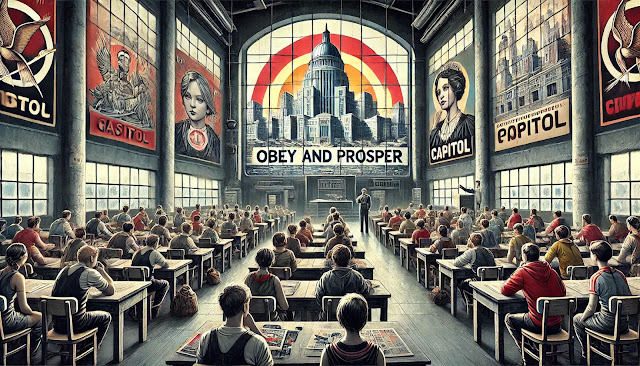The Role of Education in Reinforcing Dominant Norms in The Hunger Games
Fictional literature rarely delves into the societal role of education systems and curricula. While reading Suzanne Collins's The Hunger Games series, I was drawn to how education is depicted as a tool for power and control. These popular novels, which have also been adapted into films, offer suspenseful storytelling and a thought-provoking perspective on societal structures and the exercise of power.
In the world of The Hunger Games, the state—reminiscent of a dystopian United States—is divided into twelve districts ruled by the Capitol. Life in the districts is marked by scarcity and hardship, while the Capitol thrives in excess and luxury. The Capitol tightly controls the districts, and education is one of its primary tools of oppression. The Capitol dictates the curriculum, ensuring students are taught only what serves the regime's interests. Crucial knowledge, such as information about other districts, is deliberately omitted to prevent alliances or collective rebellion. Geography, for instance, is taught in a highly restricted manner.
History lessons focus almost exclusively on the Capitol's victory over the districts' rebellion and the debt each district owes to the Capitol. Students are taught the structure of their society and its justification, which is never questioned. Schools also instill the belief that the brutal Hunger Games are a necessary and even positive institution. The Games, designed to instill fear, are a powerful means of control, and manipulating emotions such as fear and guilt is a central part of the curriculum. Through education, district residents come to see the rebellion of their ancestors as a grave mistake and accept collective guilt for it. This psychological manipulation helps the Capitol maintain its power, as people internalize its perspective as their own. Every aspect of education is crafted to reinforce the Capitol's dominance.
Education in The Hunger Games is not just about what is taught but also about what is left untaught. A lack of knowledge becomes a tool of manipulation. The residents of the districts remain unaware of their ignorance, which prevents them from questioning the status quo. Specific skills, such as hunting or self-defense, are deliberately excluded from the curriculum because they could enable independence or resistance.
However, school subjects are not the only things learned in schools. Attitudes and cultural capital are also imparted. Teachers typically adopt the values and ideals of the dominant class—in this case, the Capitol. As a result, their attitudes and values reflect Capitol ideology, shaping the content and tone of education. The Capitol also determines the nature of valuable cultural capital, such as specific ways of speaking or thinking.
This internalized cultural capital is evident in the series through the difficulty of inciting rebellion among the district's residents. People are reluctant to "rock the boat" and see little need to do so, even though, from the reader's perspective, they live under an outrageously unjust and cruel system.
The story's protagonists, by contrast, have broken the rules their entire lives. They have hunted illegally and traded in the black market. Their cultural capital is rooted in defiance of the Capitol's authority, though this is undoubtedly not something learned in school. They struggle to comprehend the deeply internalized cultural heritage of others, which demands obedience and acceptance of Capitol rule. This mindset presents a significant barrier to rebellion. The education system, as designed by the Capitol, functions precisely as intended: it reinforces the norms of the ruling class and prevents the emergence of dissent.
This depiction of education evokes historical authoritarian education systems, such as those in Nazi Germany and the Soviet Union. Both used education to reinforce ruling ideologies and normalize subjugation. Like the Capitol, these regimes manipulated history censored information and created enemies to ensure that students internalized the rulers' views without questioning the legitimacy of the system.
Even in modern democratic societies, parallels to the Capitol's education system can be found. In some U.S. states, efforts have been made to restrict the teaching of specific historical topics, such as Black history and Indigenous experiences. Similarly, book bans and limitations on sex education reflect the same logic: controlling information to advance ideological goals and suppress alternative perspectives. These actions reinforce power structures and perpetuate a worldview defined by those in authority, much like the Capitol. Such comparisons highlight how education and the control of knowledge can be powerful tools of governance in any society.
This essay draws on ideas from Chad William Timm's article "Class is in Session: Power and Privilege in Panem," featured in the anthology The Hunger Games and Philosophy: A Critique of Pure Treason (Blackwell, 2012, pp. 277-290).

Kommentit
Lähetä kommentti